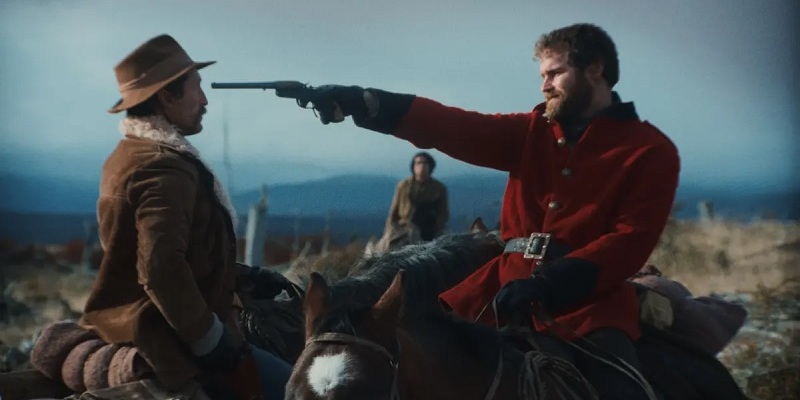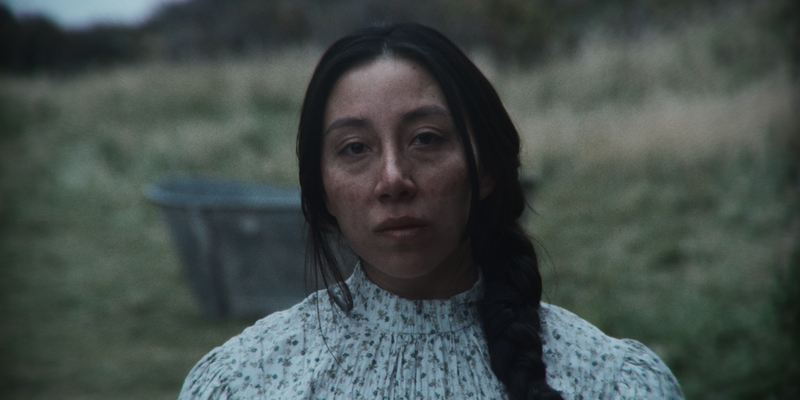
Review by
Eric Hillis
Directed by: Felipe Gálvez
Starring: Mark Stanley, Camilo Arancibia, Benjamín Westfall, Alfredo Castro,
Mishell Guaña, Agustín Rittano, Mariano Llinás, Sam Spruell, Adriana
Stuven, Luis Machín, Marcelo Alonso

Even in the western genre, known for delivering hard-hitting,
revisionist takes on proud histories rooted in white supremacy,
Felipe Gálvez's directorial debut The Settlers is
striking in its portrayal of atrocities committed against an indigenous
people. Not because it's particularly graphic (this isn't
Soldier Blue) or blunt in its condemnation of the birth of a nation (in this case
Chile) but because it's so matter of fact about the evil men do.
This banality of evil is demonstrated almost immediately when a chain
gang worker loses an arm in a fencing accident. His Monty Python-esque
pleas that he can carry on with one arm are ignored by MacLennan (Mark Stanley), a Scottish former British army lieutenant who still wears his red
coat. "One less arm is one less man," MacLennan decrees before shooting
the man dead. The other prisoners barely flinch, having clearly grown
accustomed to such cruelty.

MacLennan is essentially hired muscle for landowner José Menéndez (Alfredo Castro), who assigns the Scot the task of clearing a path for his sheep to be
brought to the Atlantic coast. "Clearing" translates as murdering every
native that stands in the way. To accompany him, MacLennan selects
Segundo (Camilo Arancibia), a young mixed race Mestizo who is a
crack shot with a rifle. Unimpressed with his selection, Menéndez
demands that the pair be joined by Bill (Benjamin Westfall), a
Texan mercenary.
As the two English speakers quarrel while Segundo rides silently along,
the film initially resembles many a classic western setup. The
difference here is that it's unlikely that this odd trio will bond in
any conventional manner. All three hold the others in contempt, and
nobody trusts anyone else. Segundo's ethnicity might suggest he's set to
rebel and side with the people with whom he shares half of his blood,
but again convention is bucked. Segundo is concerned chiefly with
staying alive, though his finger does occasionally waver over his
trigger when he has his white travelling companions in his sights.

The Settlers treads a Conradian path as its protagonists
venture toward a beating heart of darkness. They encounter friends and
foes, though sometimes it's hard to tell the difference. The film is
largely broken into vignettes detailing such encounters. A meeting with
Argentine soldiers results in pathetic displays of macho rivalry as the
men square off in bouts of marksmanship, arm wrestling and boxing. A
tribe of native Onas is wiped out by the gun-wielding MacLennan and Bill
while Segundo fires his gun in the air, faking participation. At the
coast the men stumble across a Colonel Kurtz figure in the form of a
British army colonel played by an intensely sinister
Sam Spruell.
The latter encounter reinforces the idea that prejudice and notions of
superiority are far more complex than simply white men versus natives.
Having lorded it over Segundo throughout the expedition, MacLennan is
suddenly reduced to a similarly lowly stature by the English Colonel,
who looks down on him for being a Scot and a lower rank. Seeing
MacLennan reduced to a pathetic, trembling figure when faced with the
sort of authority he sought to emulate himself speaks volumes about how
imperialism was able to function.
Shooting in 1.33 ratio, cinematographer
Simone D'Arcangelo paints tableaus of men riding across a harsh
terrain, a rugged beauty dismissed by those begrudgingly working its
land, likely to avoid imprisonment in their own homelands. For all their
bluster, both MacLennan and Bill are working class men who no doubt were
treated as badly in their own lands as they now treat the natives of
this new world, like bullied children who grow up to beat their kids.
They're a despicable pair, but all too recognisable.

It would be impossible to describe Segundo as the "heart" of the film,
rather he represents the empty cavity where a heart once throbbed. Like
his land, he's been ravaged, anything resembling a soul ripped out of
his core. That he struggles to even summon up anger tells you how broken
he's become. When MacLennan insists that he join in the rape of a
captured native woman, Segundo displays the closest the film comes to
compassion by ensuring she escapes a fate worse than death. You can't
help think that he is himself a product of such an unholy union.
In the closing scenes we flash forward several years as a government
representative speaks of forging a new Chile where settlers and natives
can live in harmony. As he attempts to coerce a native woman into posing
for a photo while dressed as a European and drinking tea, it's clear
that harmony means the extinction of a culture, not by guns this time,
but an erasure nonetheless. The Settlers suggests that
like Segundo, the nation of Chile is the product of a forced
coupling.

